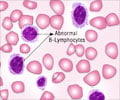A genetic network that has been found to support a high-risk and aggressive form of Acute Myeloid Leukemia has been discovered.

The specific forms of AML and MDS in the current study involve deletions on the arm of a specific chromosome in blood cells (del(5q). In patients with less aggressive forms of del(5q) MDS, the percentage of bone marrow blasts in their blood (the earliest, most immature cells of the myeloid cell line) is less than 5 percent. This means treatment prognosis for those patients typically is good, according to the study's lead investigator, Daniel Starczynowski PhD, a researcher in the division of Experimental Hematology and Cancer Biology, part of the CBDI at Cincinnati Children's.
"Unfortunately, a large portion of del(5q) AML and MDS patients have increased number of bone marrow blasts and additional chromosomal mutations," Starczynowski said. "These patients have very poor prognosis because the disease is very resistant to available treatments such as chemotherapy and radiation. Finding new therapies is important and this study identifies new therapeutic possibilities."
The researchers conducted their study in human AML/MDS cells and mouse models of del(5q) AML/MDS. They found that reduced expression of a certain gene in blood cells (miR-146a) led to activation of a molecular signaling network involving several components of NF-kB, one of which involved a protein called p62 – a critical regulator of cell metabolism, cellular remodeling and certain cancers.
Deletion of the miR-146a gene led to overexpression of p62, which caused sustained activation of what researchers identified as an NF-kB signaling network. This fueled the survival and aggressive growth of leukemic cells in cells and in mouse models.
Earlier attempts in previous studies to directly inhibit NF-kB (a key molecular facilitator to the leukemic process) have not proven successful, according to investigators on the current paper. So the authors performed follow-up laboratory tests to look for possible vulnerabilities to NF-kB and a potential workaround by targeting instead p62 within the NF-kB signaling network.
Advertisement
Starczynowski stressed that significant additional research is needed to further verify the findings and learn more about the molecular processes involved. He also cautioned that laboratory results in mouse models do not necessarily translate to humans, and it isn't known at this time how the findings might be directly applicable to clinical treatment.
Advertisement
Source-Eurekalert












